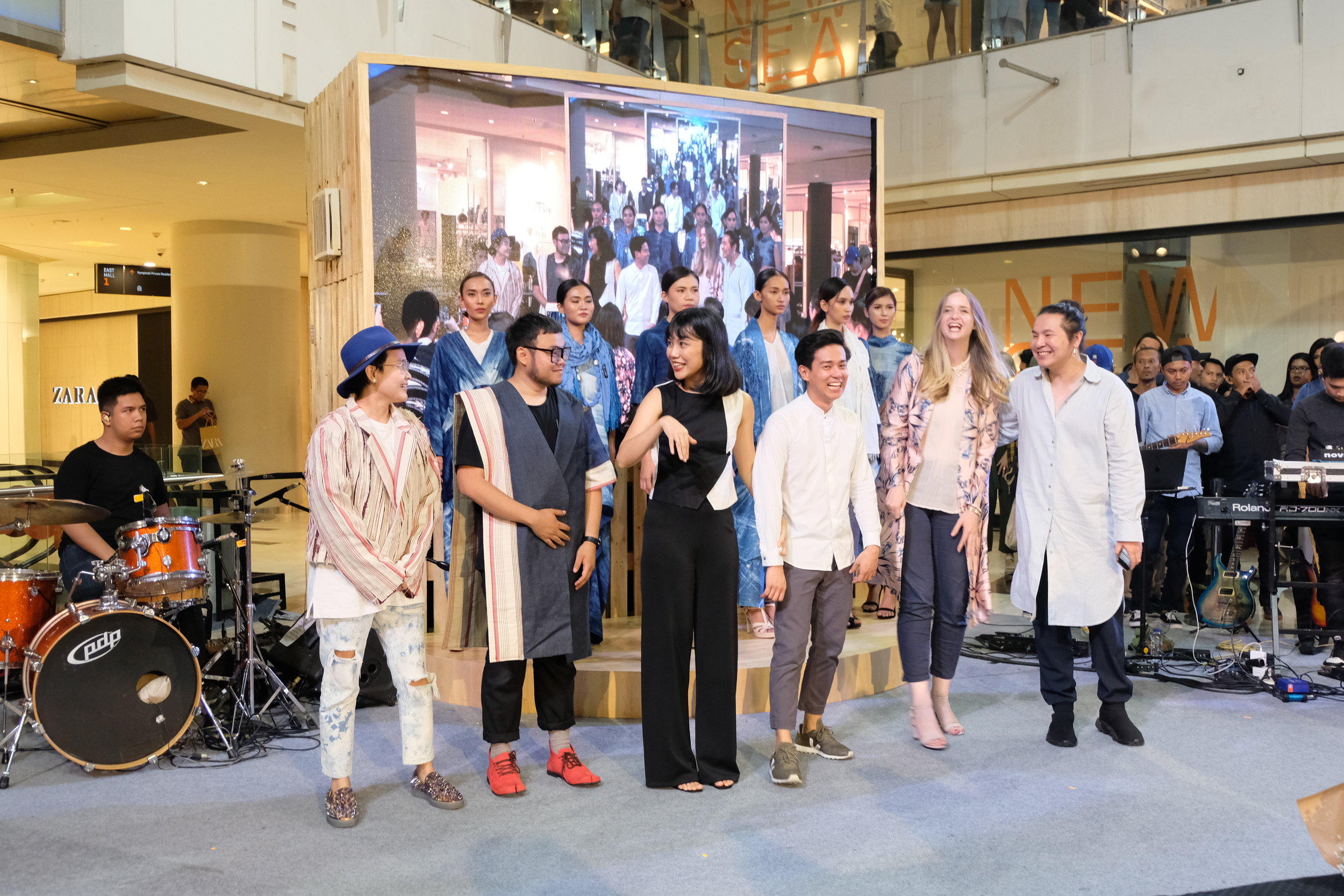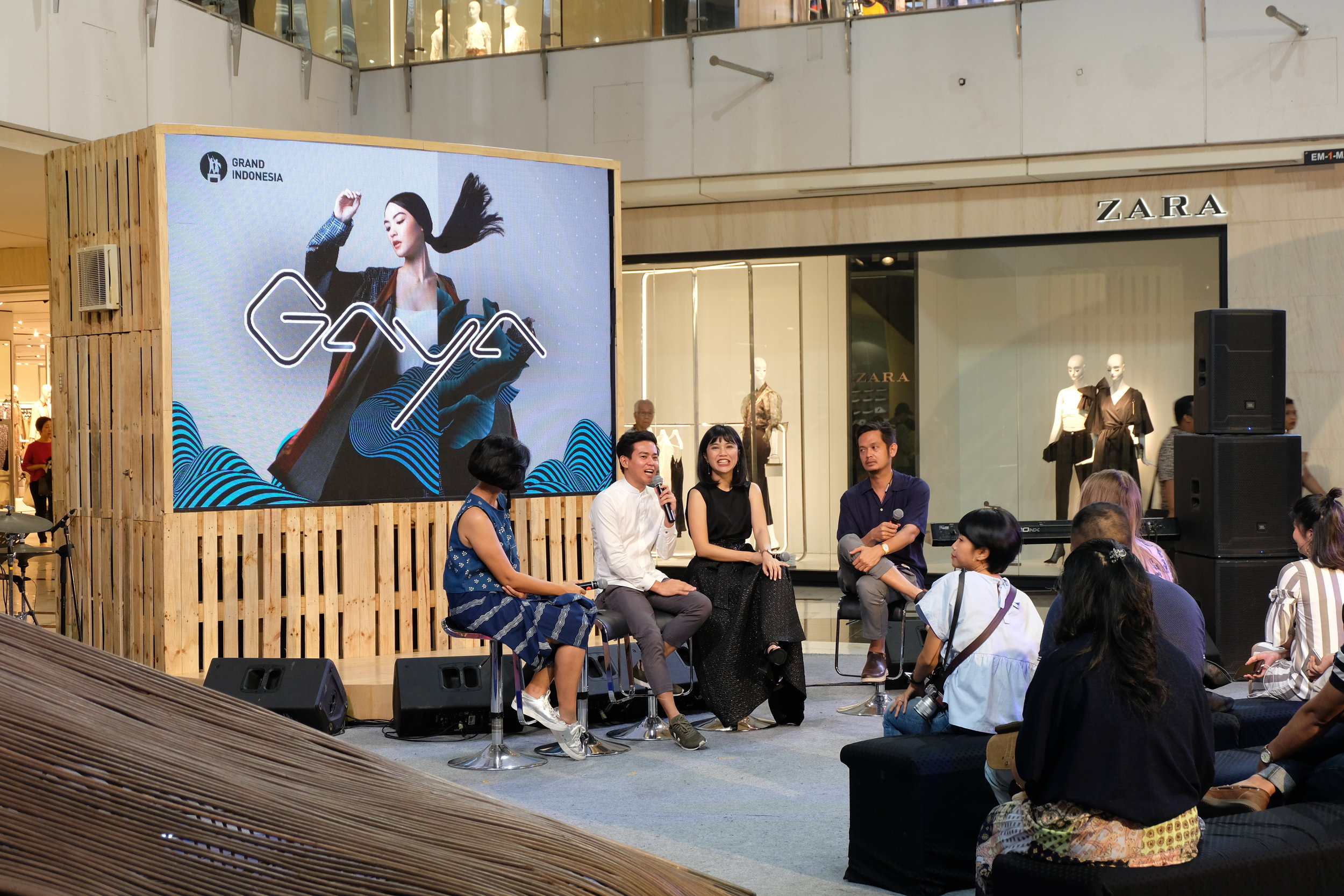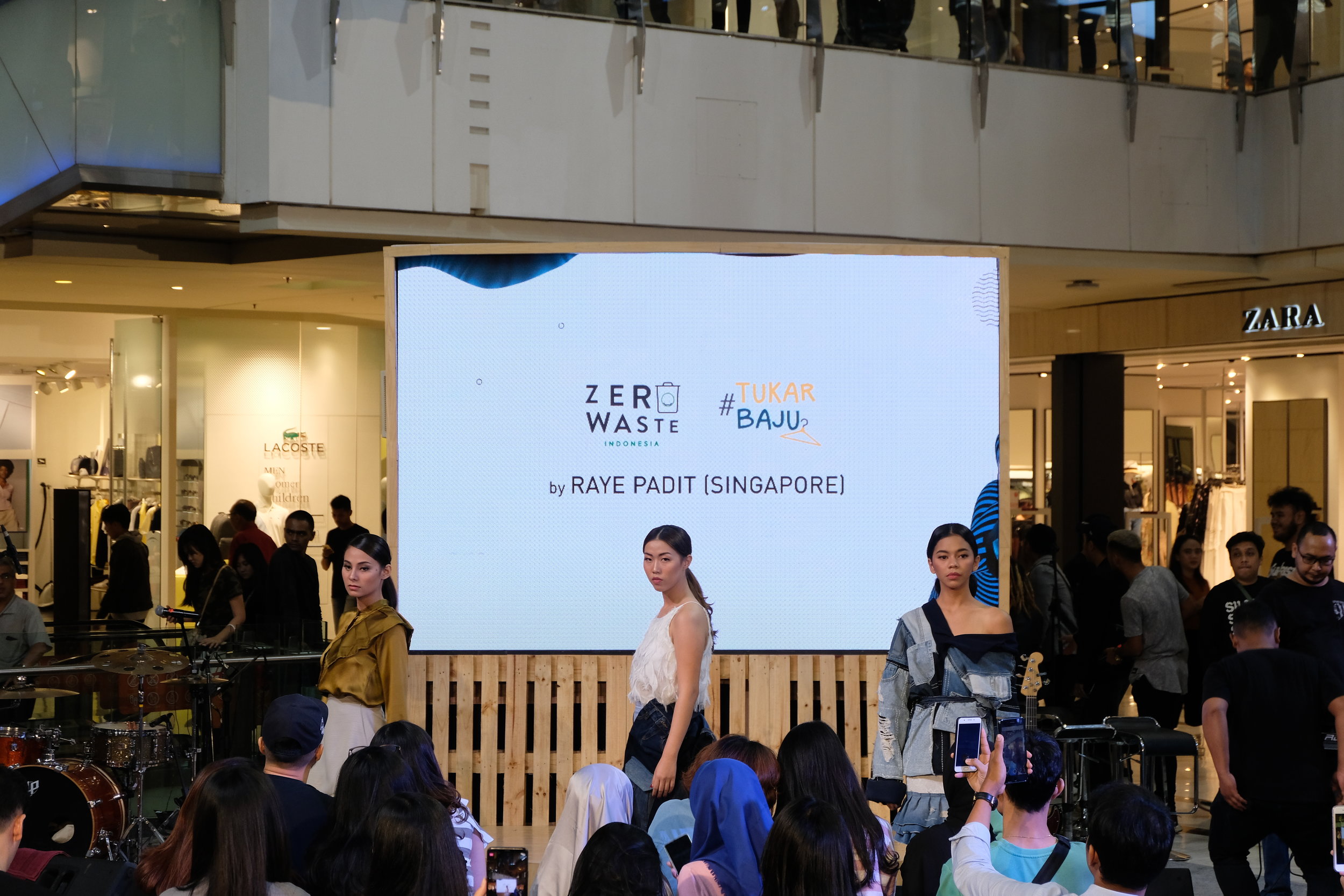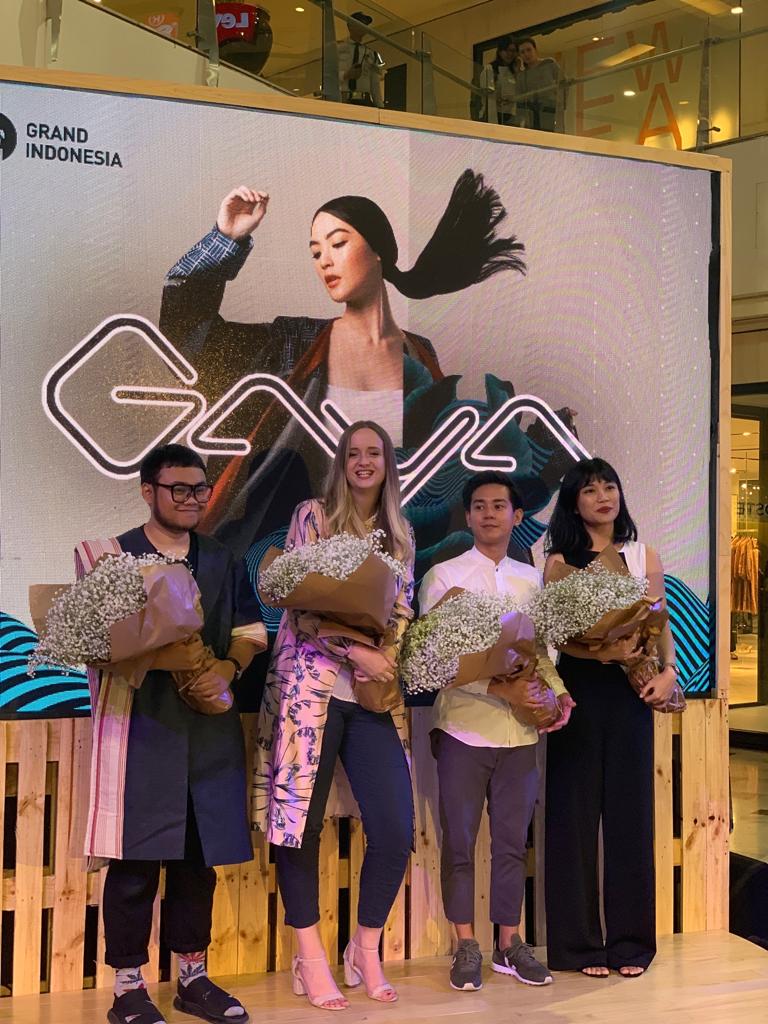Sustainable Fashion Worldwide: First stop, Jakarta!
Dress rehearsal with the models before the big show!
May 2015 – I still vividly remember the conversation I had with a good friend over a Starbucks cup about the sustainable fashion movement in Singapore and the possibility of reaching out to neighboring countries. We were both so fired up, determined to start and grow the movement. With no concrete plans on how we were to go about it, we could only discuss the awareness we needed to raise and the importance of grabbing every opportunity that comes our way. Fast-forward to today, we have had the fortune to witness various events, organizations, individuals and cities not only talking about, but also actively doing something to help promote and advance sustainability in fashion. No one can stop the movement now and I am confident that it will only continue to grow.
First stop, Indonesia! The sustainable fashion movement is catching up in Jakarta, a global city known for one of the fastest growing economies in the world with an estimated population of over 10 million people. I had the opportunity to see it for myself last month when I was invited by ZeroWaste Indonesia and Tukar Baju, organizations part of the GAYA initiative led by Grand Indonesia, one of the biggest malls in the country. In addition to the exciting events lined up – fashion shows, talk shows, and meet-and-greet – I was looking forward to having conversations with everyone to learn more, build meaningful relationships and understand how they are navigating the scene to inculcate sustainability as part of the lifestyle of everyday Indonesians.
Image by: Grand Indonesia
Here are some takeaways that I’d love to share with you:
1. Developing a business can be an opportunity to shape the kind of future you want to live in!
When I received the invitation to participate in the GAYA initiative, my first question was “who is the organization behind this initiative?”. I asked a good friend from Jakarta if she knew anything about Grand Indonesia aside from being one of the biggest malls in the city. Her first reaction was “Wow, that’s amazing to know that they are leading this initiative”, considering that they are in an extremely retail-driven industry that thrives on consumption. Although I have noticed more businesses pushing the needle on sustainability in the recent years, I was still taken aback by this opportunity. This initiative was completely unique to me as it was targeting both the customers and the stakeholders of the organization, hence my curiosity and excitement to meet them! I was determined to squeeze in time regardless of my tight itinerary, as I wanted to have a chat with them to understand more about the initiative and their rationale behind it.
On the first day after the eventful opening, I asked the event coordinator whom should I approach if I wanted to interview the person behind the initiative. I was asked to send in my questions and purpose for the interview, a standard process for big companies where certain protocols need to be followed. After a day they got back to me that my request was granted, but that some questions would need to be omitted (they may have been considered too sensitive or less appropriate). I agreed and had the privilege to meet Dinia Widodo, PR Manager of Grand Indonesia, who was heading the initiative.
A quick break --- let me give you a behind-the-scenes of the interview: Aside from including the interview in this blog, the main intention of the interview was to include it in the latest podcast that my lovely friend Laura and I had launched last month, The S Word (check it out if you haven’t yet available in Spotify, iTunes, or anywhere you get your podcast). However, when I got back to the hotel and wanted to check the recording, the app malfunctioned and only saved the second part of the recording, which was the last 3 minutes of the conversation. ☹ ☹ ☹ I guess that means no podcast for now.
It was a lovely conversation with Dinia, and also an extremely insightful one as I begun to understand more about the initiative and why Grand Indonesia took the risk in leading the movement when most businesses wouldn’t have in city like Jakarta. It was jaw-dropping to learn how much impact they can make with the scale of their business. Dinia explained that with their approximately 350 tenants and 24 million mall visitors (according to 2018 statistics), they realized they have the power and responsibility to influence these stakeholders in making smart decisions to pursue a more sustainable lifestyle; hence, the need to create this initiative.
The GAYA initiative was simply a way to engage their tenants on rethinking how they can reduce or eliminate plastic use from their daily operations. The tenants immediately responded to this initiative positively – about 40% of their food and beverage tenants no longer provide plastic straws to their customers and about 70% of their tenants no longer use plastic bags. Their aim is to increase the participation of their tenants to 100%. I myself experienced this on the last day; I was exhausted after the fashion show and decided to grab a box of pizza back to the hotel room. To my surprise, the restaurant did not provide me with any plastic and only used a twine string instead of a plastic string for me to carry the hot pizza!
On the consumer side, Grand Indonesia is encouraging mall-goers to BYO bamboo/metal straws, reusable bags and cups, and plan to reward this behavior with incentives. This is where the 4-day event launch of the initiative came in handy as it served to educate the consumers about the environmental and social impacts of our choices. Public figures / influencers and celebrities who are leading the sustainable lifestyle movement in Jakarta were invited to share their journey, some practical tips and inspire everyone to take small steps to be green. A fashion show showcasing brands with sustainability as a part of their DNA was also held.
Imagine if these 24 million mall-goers all BYO-ed and supported sustainable brands, how big would their impact be? The takeaway from my conversation with Dinia was that, no matter how risky, uncertain and unclear an ROI could be, if it’s about doing the right thing, it will just have to be done. Along the way you will figure it out and improve. Indeed, businesses that existed before us shaped our present, and it is now our time to create businesses that will help shape the future, and for the existing businesses to change/improve their old ways to address the negative environmental and social impacts that we are now faced with.
Clothes Swap by Tukar Baju during the GAYA event launch (Image by: ZeroWaste Indonesia)
Earlier this year, I had the opportunity to meet Amanda, who is now the head of PR for ZeroWaste Indonesia and the Project Manager for Tukar Baju. She accompanied her friend to a swap and was interested in the idea of clothes swapping. When she moved to Langkawi, Indonesia, we continued chatting about her idea of organizing a swap in Indonesia. I saw the fire and eagerness in her to start the movement and was happy to mentor Tukar Baju. Watching her from the sidelines of social media, I was pleased to witness how quickly the movement grew in only 3-4 months. I remember one of our conversations, where she shared that her goal was to organize 4 swaps this year in different cities – a goal she had already exceeded in only 4 months.
At the recent swap event, they organized a part of the GAYA initiative and collected over 3600 clothes from 1000 swappers with over 1400 clothes swapped. I was excited to interact more with the swappers in Jakarta and hear their stories; unfortunately, conflicting schedules and the language barrier did not allow me to do so – although I did get an inside scoop from Amanda every time we had the chance to chat. She shared that she faced pretty much the same challenges that we had, in addition to some unique ones. For example, they are unable to arrange a separate day for drop-off from the actual swap day like we do for our pop-up swap events here in Singapore because it takes too much time to travel to their event locations in Indonesia. Hence, a same-day drop-off and swap has to be arranged to make the trip worth it. The motivation for Indonesians to swap is very similar to that of our members here in Singapore – 60% of the members swap due to the impact it has on sustainability, and 40% swap due to the need to have new items at an affordable price as well as to declutter their wardrobes.
With Amanda of Tukar Baju (left) and Dominique Diyose, Co-founder of Bali Swap and Model
While I was in Indonesia, there was another swap party in a different mall organized by another group, Tri Upcycle and Young Changemakers Social Enterprise. Checking out that swap led me to meet one of the co-founders of Bali Swap, Dominique Diyose. Swapping is indeed picking up momentum in different cities regionally. Not just in Indonesia, but also in Yangon, Myanmar, where swap events are organized almost every other month, and whose organizer I had the opportunity to chat towards the end of last year; and Kuala Lumpur, Malaysia, where a lady who recently reached out to me is also planning to organize clothes swaps. Swapping is definitely invading different cities and it is thrilling to see how we can make it part of our lifestyle.
I often am asked if the swapping concept will work elsewhere in Asia aside from Singapore, and I’m always hesitant to share my opinion as I have not seen swaps in action in other places. However, after seeing the Jakarta swap events and chatting with various individuals who are organizing swaps or planning to, I found the answer I was looking for. Swapping transcends cultural beliefs, individuals’ economic status, countries’ GDP and the stigma of secondhand. You don’t have to be in a certain place or situation to understand why swapping is good for both your wallet and the planet. My major takeaway from this trip was the reminder that we shouldn’t forget what we have learned from all our swap experiences and at the same time, we should not have those learning points cloud our judgement when exploring new markets or planning a new initiative. On that note, stay tuned for an exciting initiative that we are working on next year!
There was one question that the host asked me during the talk show and that I am still trying to figure out an answer to. He asked, “With all the buzz on sustainability and new businesses sprouting in response to it, as well as established businesses taking the initiative to do something about it, do you think sustainable businesses can be profitable and successful?”
Personally, it was a loaded question because The Fashion Pulpit had only turned 1 recently, and I was worried if I would be able to answer his question adequately at only 1 year since founding The Fashion Pulpit or if my answer would be credible. I also have questions for this question! How much profit does it take before we consider calling a business profitable or successful? When we say profit do we only measure the monetary amount generated, or are we also considering different factors such as how much waste is generated, or what your carbon footprint is, etc.? With the existing system we have, is it fair for us to continue assessing new business models or innovative ideas that address important global problems the same way that old businesses that do not solve such problems but instead cause them were assessed? Is it too soon for us to start reviewing if sustainable business are successful or profitable when this movement had only started not so long ago?
With that being said, if you were asked the same question, how would you answer it?
Love,
Raye Padit
Founder









